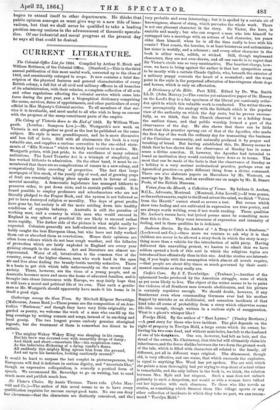The Colony of Victoria down to the End of 1863.
By William West- garth. (London : Sampson Low.)—Mr. Westgarth's new work on Victoria is not altogether as good as the last ho published on the same subject. His style is more grandiloquent, and he is more discursive and less full of facts. Still with all abatements the book is a very valuable one, and supplies a curious corrective to the one-sided state- ments of "Ella Norman" which we lately had occasion to notice. Mr. Westgarth points, with just pride, to the excellence of many colonial nstitntions. The Land Transfer Act is a triumph of simplicity, and has worked hitherto to admiration. On the other hand., it must be re- membered that there are no complications of tenure in a new colony, and comparatively little crowding of properties. The fact that large mortgages of live stock, of the yearly clip of wool, and of growing crops of fruit are constantly taking place speaks much in favour of com- mercial morality. A democratic legislature has managed hitherto to preserve order, to put down riots, and to sustain public credit. It is found possible to employ professors and schoolmasters who are not literally pledged to the Prayer Book, and the system is not believed as yet to have destroyed religion or morality. The days of great profits have gone by, but society is all the more settling down into healthy conditions of equable industry. Australia is still the paradise of working men, and a country in which men who would succeed in England in any sphere of practical life are likely to succeed rather more rapidly. The darker side of the picture is what might easily be expected. Colonists generally are half-educated men, who have pro- bably caught the best European ideas, but who have not fully worked them out or absorbed them as convictions. Hence their opinions are often loose colours which do not bear rough weather, and the fallacies of protection which are fairly exploded in England are every year gaining strength in the colonies. Art and literature are almost un- represented. Worst of all, intoxication is the common vice of the country, even of the higher classes, men who work hard in the open air and live alone finding the brandy-bottle terribly seductive. There is a haste to get rich which tells unfavourably on the moral tone of society. These, however, are the vices of a young people, and as Australia becomes more and more the home of educated families, and is brought into closer intercourse with Europe, we may fairly hope that it will have a moral and political life of its own. That such a gentle- man as Mr. Westgarth should apparently have made it his home is in itself a good sign.






























 Previous page
Previous page